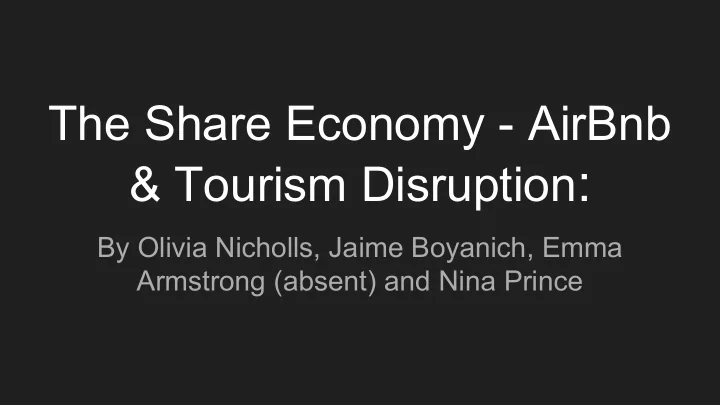

The Share Economy - AirBnb & Tourism Disruption : By Olivia Nicholls, Jaime Boyanich, Emma Armstrong (absent) and Nina Prince
What is the Share Economy? “Collaborative Consumption” “Peer economy” (Forbes, 2016) What was once exclusive is now shared Image: http://www.shareamortgage. com/userfiles/images/the-sharing-economy-with-purple- frame-1.png
‘University of Chicago Law Review’ Definition 1. Rely on recent technology 2. They exist parallel to established industry 3. They operate under limited law
Oh… and Tourism Disruption? Tourism disruption is basically as it sounds… Tourism industry 10 years ago vs today - Airbnb and similar services providing new options for travellers, which is impacting traditional businesses - Capitalising on new technologies - Personalised
Interest Groups & Stakeholders... ● Entrepreneurs ● Local and international competitors ● Hosts and service providers in the Share Economy ● Participants in Share Economy services ● Governments around the world ● Environmental groups
How Airbnb works Hosts list properties on Airbnb website for free and choose their price Hosts can promote properties through titles, descriptions, photographs with captions (and themselves through a user profile) Anyone can search for properties, but only members can “Book It” Travelers are not charged until the host confirms the reservation
Why so popular? - Accessibility (both host and provider and ‘customer’) - Low costs - Lack of regulation - Unprecedented opportunities - Piggy-back companies
Some More Examples: Well known: Uber, Airbnb, Facebook local buy/sell groups, Fairtrade Lesser known: - DogVacay - TaskRabbit (temporarily hire people to complete certain tasks) - Getaround & RelayRides (borrow cars) - Zearly (offer services to other people), - Lending Club (borrowing cash) - Foh (sharing wifi) - Poshmark & Neighbourgoods (buy/sell clothes) - SnapGoods (lend and borrow high-end household items, i.e. cameras, kitchenware) - Source: Forbes 2016
PESTLE analysis Political: regulation, safety, taxation Economic: competing with traditional established companies, cheaper services, maximising personal resources, supplementary incomes for service providers/hosts
PESTLE continued... Sociocultural: concept of “sharing”, convenient, opportunity for investment, personalised experiences, targeting people from all demographics Technological: engaging with latest technology, new app features, interconnected networks of people internationally, need to be tech-savvy to participate Image: http://bungalower.com/wp-content/uploads/2014/03/Uber- iPhone.png
PESTLE continued... Legal: insurance policies, terms and conditions, Varying laws in different countries (Amsterdam VS Santa Monica, Strict privacy policy overall Environmental: renting instead of buying new is environmentally friendly, minimising the waste of resources, noise and behaviour complaints by local residents,
PR artefact Opportunity: “Change the way people travel” Stakeholder interests and analysis - Airbnb - Hosts - Patrons - Competitors - Neighbours
Journalism artefact What is the story being communicated? An Airbnb ‘horror story’ of an unsuspecting family renting a house with a drug lab during a police raid. What are the practices involved in putting the story together? Interviewing family involved, sourcing photographs of that family and the drug set-up, interviewing Airbnb. What are the disciplinary principles at work in the story (news values, stakeholder interests, materials, format, medium and channel) News values: conflict/crime, bizarre, currency, proximity, Stakeholders: Airbnb, family involved, police, Airbnb customers and hosts, Materials: photographs, direct quotes Format: short news article Medium: online news site Who does the story address? Who is it talking to? General public, those who use or might consider using Airbnb.
Advertising artefact... AirBnb’s “Don’t Go There, Live There” campaign; personalised, emotional Caption: “ When you stay in an Airbnb, you get more than a home. You get more than a city. You get a neighbourhood. The local coffee shop is yours, too. Wherever you go, you get to feel like you #LiveThere. Even if it’s just for a night. ” https://www.youtube.com/watch?v=1AtjOKph7-k
Media artefact... Story: Gebbia, J. (2016), How Airbnb designs for trust…. Available from: https://www.youtube.com/watch?v=16cM-RFid9U Assessed date: [19.04.2016] Practices for putting the story together: Joe Gebbia is the co-founder for Airbnb Commercial interest Corporate voice Promotional TED talk Conducted a joint study with Stanford University Research into the story of the guest who stayed with a host in Uruguay and South Korea’s share economy Viewing TED talks from other shared economy Format: Performance from the TED Conference Medium: Video podcast Channel: Youtube, TED website Audience addressed: Any TED talk conference goers, Story speaks to…: Persons with Airbnb queries, Airbnb users,potential Airbnb users, Anti-Airbnb users and tourists
Ideas... PR: On behalf of Real Estate. Airbnb taken over the digital holiday accommodation economy. ‘Serving you for years’ type angle. Still developing a news story for this Goal: Making traditional businesses in real estate sector more relevant to today! Journalism : The piggy-back businesses relying on big players in the share economy. Interview a founder of one of these businesses and what they think the future holds, particularly in regard to changes in the regulatory framework. Advertising: “Stayz” - underrepresented holiday accommodation site. Because Airbnb have strong advertising campaigns (as just seen, on TV etc), Stayz need to match this. Media :There have been many examples of distrustful relationships between the owner and renter.(http://www.foxnews.com/travel/2014/05/08/10-incredible-airbnb-horror-stories.html) Goal: Increasing the “trust” relationship by conducting live video calls where a more intimate relationship can be formed and there is a option for a live tour of the house.
Advertising Idea.. “Stayz” - underrepresented holiday accommodation site Because Airbnb have strong advertising campaigns (as just seen, on TV etc), Stayz need to match this.
And a recent event in the media... http://www.abc.net.au/radionational/programs/drive/supreme-court-to-rule-on- legality-of-airbnb-for-renters/7368254
And another... http://www.domain.com.au/news/airbnb-victorian-laws-under-pressure-as- landlord-fails-to-evict-sublet-tenants-20160401-gnv3p4/
In Conclusion... -Share economy is prospering, going from strength-to-strength, and is here to stay -Regulators around the world are similarly grappling with the issues. Opposing sides of the debate argue that: • Sharing economy services operate outside the rules and regulations which exist to “protect public safety, ensure people pay their fair share and guarantee workers’ rights.” They compete with existing providers without being held to the same standards and rules. • Rapid growth of the sharing economy alleviates the need for much top-down regulation, because it does a better job of serving consumer needs. Continued application of outmoded regulatory regimes is likely to harm consumers. -Watch this space!
Thank you!
Recommend
More recommend